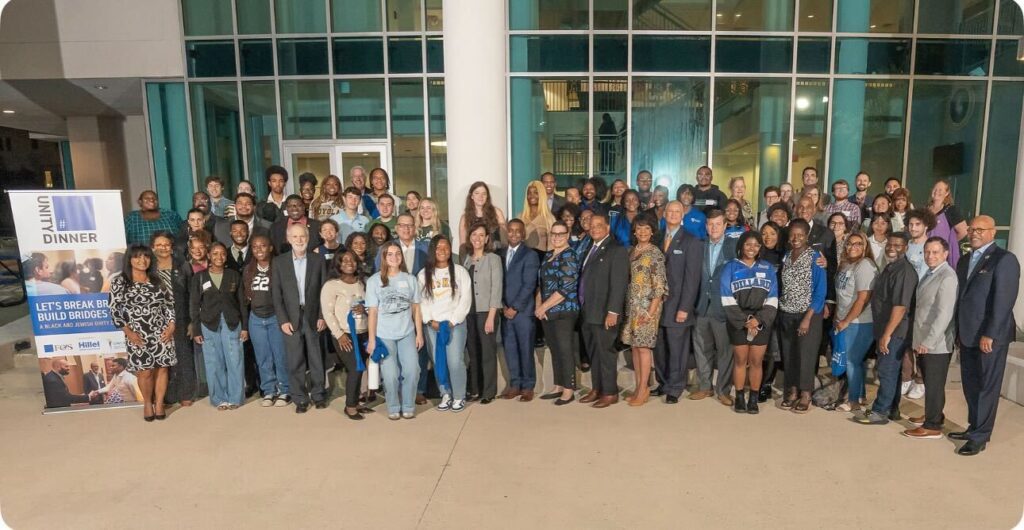Black-Jewish Unity Dinner Series Offers Connection, Relationship-Building, and Hope for Stronger Communities

Today, many Jewish students and other students on college campuses are feeling more isolated than ever before. In fact, nearly two-thirds of college students experience loneliness and isolation on campus, and 40% of Jewish students say they need to hide their Jewish identities to feel safe and belong. How can students navigate these seemingly overwhelming obstacles, and form meaningful relationships that cross divides?
In moments like these, finding connections and building bridges between communities is more important than ever. And what better way to nurture those connections than by gathering for a good meal and even better conversation?
In partnership with the Foundation to Combat Antisemitism and UNCF (United Negro College Fund), Hillel International invited Black, Jewish, and Black and Jewish students to come together this fall for a Black-Jewish Unity Dinner series, continuing a successful partnership that began last year. By bringing together Jewish students and students from Historically Black Colleges and Universities (HBCUs), these dinners create a unique and critical opportunity for a new generation of college students to connect, communicate, and build relationships, in the hopes of creating a more just future for themselves and their communities. Recent dinners have been hosted at the National Center for Civil and Human Rights in Atlanta, GA, George Washington University in Washington, D.C., and Dillard University in New Orleans.
“This series gives students the opportunity to start building connections that go beyond social conversations, and really think about, ‘What are the things that we care about? What are the issues that matter to us?’” said Dani Levine, Hillel International’s director of social impact.
This program builds on the powerful history of solidarity, collaboration, and institutional support between the Black and Jewish academic, activist, and social communities. Because participants at the dinners are students who have chosen to be part of communities like HBCUs or campus Hillels, these events give attendees a chance to consider how they want to bridge differences between and across those spaces and find areas of shared interest, connection, and opportunities for action.
“I really enjoyed the opportunity to engage with college students from a different background from myself,” said Maya Rezak, a senior at Emory University who attended a dinner in Atlanta with other members of her campus Hillel. “In particular, I realized how much more I have to learn from others.”
“I had a great conversation with a Jewish student at Loyola, and learned that we went to our respective schools because of a need to be understood,” said Madison Lindsey, a junior at Xavier University of Louisiana who came to the event in New Orleans, where there were nearly 90 people in attendance. “I’m glad I made a new friend.”
New friendships are just one of the many outcomes organizers hope to see from these events. As part of the initiative, Hillel International is offering students who attend the dinners up to $1,000 in microgrants to host a follow-up event of any kind — the only requirement is that they are student-led by at least one Hillel and one HBCU student.
“We know these dinners are just the start, and we don’t expect students to try to follow up on their own without any support,” Levine said. “The microgrants are a way for them to keep those conversations going. There’s tremendous value in all kinds of social connections that students form.”
Since the most recent dinner in New Orleans, students have reached out to start the process for applying for the microgrants, already planning the next step in their relationships and conversations.
“Especially in the wake of October 7 and its aftermath, we want students to understand the value of affinity spaces like Hillels and HBCUs, but also the power that can come when you gather with people from other affinity spaces and share what you have in common,” Levine said. “We want to continue to build the kind of thriving community that has space for all of us, by building relationships and learning from each other.”